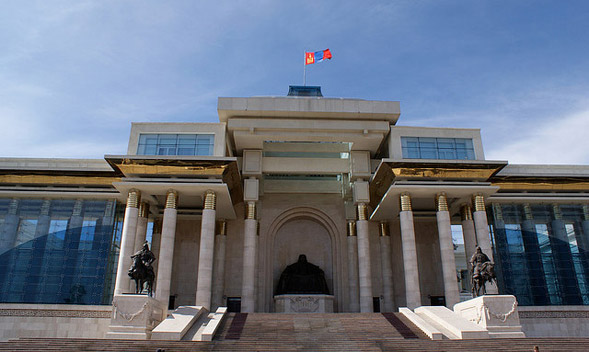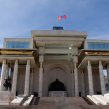
A New Mongolian Government Is Finally Formed
Publication: Eurasia Daily Monitor Volume: 9 Issue: 164
By:

On August 25, Prime Minister Norovyn Altankhuyag chaired the first full cabinet meeting since Mongolia’s sixth parliamentary election, which was held on June 28 (Mongolian Government Press, August 26). Because his Democratic Party could not obtain the 39 parliamentary seats necessary to form its own cabinet, Altankhuyag has struggled to reach a power sharing agreement with other minority parties in the parliament. According to the General Election Commission of Mongolia, the Democratic Party (DP) won 31 seats; the former majority party, Mongolian People’s Party (MPP) secured 25; the Civil Will and Green Party (CWGP) won two, the “Justice Coalition” of the Mongolian People’s Revolutionary Party (MPRP) and Mongolian National Democratic Party (MNDP) won 11; and independent candidates obtained three out of 76 seats in the Mongolian unicameral parliament. Election results for two parliamentary seats were invalidated due to judicial decisions over fraud, and these candidates did not cross the minimum threshold of 28 percent of the votes (Art. 51.1.1 of the Mongolian Law on Parliamentary Election).
In January, Mr. Altankhuyag, who was the deputy prime minister of the “Grand Coalition Government” (of the MPP and DP), which formed after the 2008 parliamentary election, announced a sudden decision to withdraw from this MPP-led coalition government to gain more popularity prior to the parliamentary election (Ardyn Erkh, January 13). This earlier decision prevented the DP from forming a coalition with the MPP. As a result, the DP entered into long negotiations with the “Justice Coalition,” led by former president, prime minister and speaker Nambaryn Enkhbayar, and Prime Minister Mendsaikhany Enkhsaikhan (Time.mn, July 16). The Justice Coalition is still demanding the exoneration of Mr. Enkhbayar, who was sentenced to a four-year prison term in connection with abuse of public office and corruption and has now appealed the court’s verdict (Unuudur, August 3). The Justice Coalition is even withholding the “swearing in” ceremony of its 11th member of the parliament (from the party list) unless Mr. Enkhbayar’s case is exonerated by the appeals court.
The other party that has entered into a governing coalition with the DP is the CWGP with two seats. In addition to appeasing the demands of this coalition party, the Chairman of the DP, now Prime Minister Altankhuyag, has had to negotiate with different factions within his Democratic Party. Until now, Mr. Altankhuyag’s cabinet has still been dividing up ministerial (ministers and deputy ministers) and executive posts of government agencies among the coalition parties and the DP factions rather than working on the government action plan (2012–2016) and reform measures. Consequently, the new cabinet increased the number of ministries from 11 to 16 while reducing the number of agencies from 43 to 28 (Government Press, August 20; Time.mn, August 22). The main opposition parties have criticized these structural changes as merely based on the interests of various political factions and coalition parties, and not boosting the effectiveness and efficiency of the government (Udriin Sonin, September 7; Terguun Sonin, August 23).
Of the 19 members of the new cabinet, 17 are simultaneously serving as parliamentary members. Although, politically, this was done to protect the seemingly fragile coalition government, it goes against the separation-of-powers principle championed by the incumbent President Tsakhiagiin Elbegdorj in January. Elbegdorj, the DP-nominated head of state, had then rejected the former MPP Prime Minister Sukhbaataryn Batbold’s decision to fill some of his cabinet posts with serving parliamentary members (News.mn, January 19). Moreover, the new DP-led cabinet features extremely powerful business interests—only three out of its 19 members are public servants while the rest are well-known successful business entrepreneurs. For example, MP Battulga (who heads the company Jenco Holding) now leads Mongolia’s Ministry of Industry and Agriculture, MP Bat-Erdene (Ajnai Corporation) heads the Defense Ministry, MP Batbayar (Fortuna Group) is the Minister of Economic Development, MP Bold (Bodi Group) leads the Ministry of Foreign Affairs, and MP Terbishdagva (TBD Anduud Group) is a deputy premier. Most of these parliamentarians’ and ministers’ business entities have diversified business interests, including mining and construction sectors. Such strong business interests are also reflected among the 76 members of the parliament, as well as with populist politicians and civil society activists. Moreover, 13 of 20 parliamentary members who pressured the government to re-negotiate the investment agreements with the Canadian company Ivanhoe and Rio Tinto over the Oyu Tolgoi mine in 2011 (Reuters, September 30, 2012) were re-elected. The rise of domestic business group interests and political populism will certainly complicate Mongolian politics in the coming years and, thus, cause political uncertainties for foreign investors.
Amidst the domestic politicking, Mongolia hosted US Secretary of State Hillary Clinton (business-mongolia.com, July 9) and the Chinese State Councilor Dai Bingguo (China Daily, August 24). Their visits were important because they stressed their countries’ growing interests in the Mongolian economy—especially in trying to secure assurances from Ulaanbaatar’s new political leaders in the parliament and government. The US company Peabody Energy and the Chinese Shenhua Energy, along with Russian, Japanese and South Korean consortiums, are competing bidders for the contract to mine the country’s largest coal deposits at Tavan Tolgoi (business-mongolia.com, June 17, 2011).
Over the past two decades, there have not been any major changes in Mongolia’s foreign policy, which often aims to maintain equidistance from its two neighbors while advancing its political, economic and cultural ties with members of the Organization for Economic Cooperation and Development (OECD), as well as India. However, the mining boom now attracts the interest of Western multinational corporations in addition to Russian and Chinese state-owned enterprises, which will force Mongolia to become more active in its foreign policy.
Mongolia’s domestic politics are unlikely to smoothen out in the coming years—changes to the parliamentary election law, especially the introduction of proportional voting, will facilitate the rise of smaller political parties and mostly ad-hoc coalitions. Moreover, the surge of business factions in parliament, combined with political populism, will further trigger competitions for political power in this fledgling democracy. A new government may have finally been formed, but this will not calm the domestic political atmosphere.




